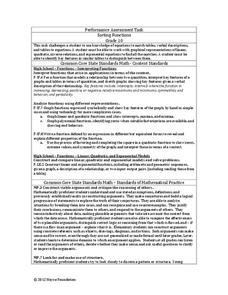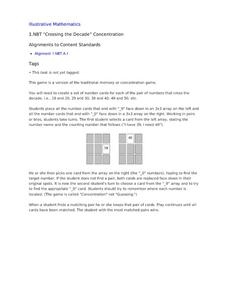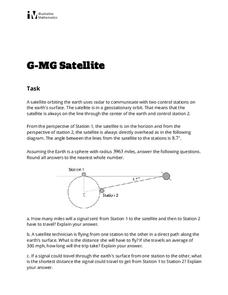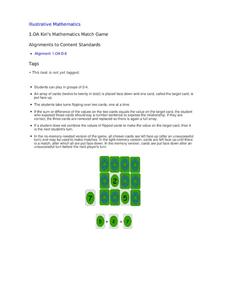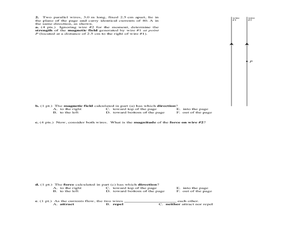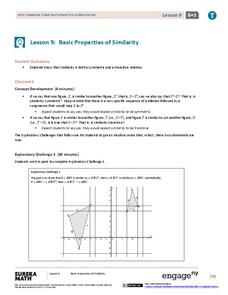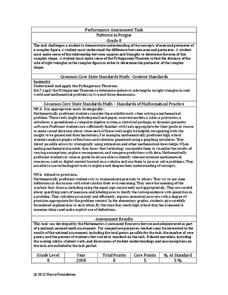Inside Mathematics
Sorting Functions
Graph A goes with equation C, but table B. The short assessment task requires class members to match graphs with their corresponding tables, equations, and verbalized rules. Pupils then provide explanations on the process they used to...
Balanced Assessment
Local and Global Behavior
Create rules for numerical sequences. Pupils develop local rules and recursive rules for number sequences. The sequences are linear, quadratic, and cubic in nature. Scholars find that some local rules do not work, no matter where in...
Illustrative Mathematics
“Crossing the Decade” Concentration
Young mathematicians concentrate on learning to fluently count. Following the rules of the classic game Memory, children take turns flipping over cards in order to find pairs of numbers that cross a decade (e.g. 29 and 30). For younger...
Balanced Assessment
Chance of Rain
Will it rain during the weekend? Pupils become meteorologists for a day as they use the assessment to determine the chance of rain for Saturday and Sunday. Class members interpret the weather statements as they pertain to probabilities...
Mathematics Assessment Project
Sorting Functions
There's no sorting hat here. A high school assessment task prompts learners to analyze different types of functions. They investigate graphs, equations, tables, and verbal rules for four different functions.
Illustrative Mathematics
Satellite
Learners practice relating rules of trigonometry and properties of circles. With a few simplifying assumptions such as a perfectly round earth, young mathematicians calculate the lengths of various paths between satellite and...
College Board
2004 AP® English Language and Composition Free-Response Questions Form B
Are there unspoken rules everyone should follow? Questions from the 2004 AP® English Language and Composition Form B ask scholars to give opinions on how unspoken rules help people belong in society. Pupils also analyze a writer's...
McGraw Hill
Irregular Verbs
It's no secret that the English language doesn't always follow clear sets of rules. Help your class adapt to these inconsistencies with this collection of grammar worksheets that teaches children the past tense form of many...
CCSS Math Activities
Smarter Balanced Sample Items: 7th Grade Math – Target B
Fraction and integer operations follow the same rules. Assess the depth of understanding with operations with rational numbers using a presentation from the Grade 7 Claim 1 Slideshow series. A set of slides presents 12 question and...
Illustrative Mathematics
Kiri's Mathematics Match Game
Learning math is so much more fun when it involves playing games. Following the rules of the classic game Memory, young mathematicians flip over two cards at a time as they look for numbers whose sum or difference is equal to the value...
Curated OER
Coffee at Mom's Diner
What is the probability that a random customer at Mom's Diner will put both cream and sugar in his coffee? Use the addition rule to find out! Use this worksheet to assess understanding, for skills practice, or during a lesson.
Illustrative Mathematics
Watch Out for Parentheses 1
Parentheses are an important tool in the algebraic toolbox in regard to the structure of the algebraic equation. They are the beginning of the standard order of operations rule, the P in PEMDAS. The central question...
Curated OER
Physics Midterm Exam #2
This comprehensive midterm exam covers a vast array of topics typical to high school physics curriculum. Problem solving and mutliple choice questions are incorporated. Review the exam to make sure that the content is suitable to your...
Inside Mathematics
Hexagons
Scholars find a pattern from a geometric sequence and write the formula for extending it. The worksheet includes a table to complete plus four analysis questions. It concludes with instructional implications for the teacher.
Concord Consortium
Last Digit Arithmetic
Mathematics involves a study of patterns. The exploratory lesson has learners consider the addition pattern in different sets of numbers. Each set has a different pattern that pupils describe mathematically. The patterns involve...
EngageNY
Basic Properties of Similarity
Does the symmetry and transitive property apply to similarity? The 10th segment in a series of 16 presents the class with a group of explorations. The explorations have pairs show that similarity is both symmetrical and transitive....
Illustrative Mathematics
Comparing Numbers
Young mathematicians spin their way to a deeper number sense with this fun, collaborative activity. Using two spinners, one with the numbers 0-9 and the other with the decades 00-90, pairs of students take turns building and comparing...
Balanced Assessment
Dog Tags
Class members demonstrate a proficiency with conditional probabilities through this task. Individuals calculate probabilities using multiplication and addition. They also distinguish between repetition and non-repetition while...
Illustrative Mathematics
Waiting Times
Probability prevails in this assignment as youngsters determine the probability of finding a blue pen in a cereal box when they can come in blue, green, yellow, or red. Learners set up a simulation to determine the outcome of compound...
Illustrative Mathematics
US Garbage, Version 1
An interesting example of a discrete function and how it is applies to the real world. This could easily make a good collaborative instructional activity with an environmental science class. Practice reading a table and drawing a scatter...
Concord Consortium
Leap Years and Calendars
How many birthdays do leap year babies have in a lifetime? Learners explore the question among others in a lesson focused on different calendar systems. Given explanations of the Julian, Gregorian, and Martian calendars, individuals use...
Inside Mathematics
Hopewell Geometry
The Hopewell people of the central Ohio Valley used right triangles in the construction of earthworks. Pupils use the Pythagorean Theorem to determine missing dimensions of right triangles used by the Hopewell people. The assessment task...
Inside Mathematics
Patterns in Prague
Designers in Prague are not diagonally challenged. The mini-assessment provides a complex pattern made from blocks. Individuals use the pattern to find the area and perimeter of the design. To find the perimeter, they use the Pythagorean...
Illustrative Mathematics
Rational or Irrational?
Is 4 plus the square root of 2 rational or irrational? After your class has gained a basic grasp of rational and irrational numbers, use this worksheet to push them a little further in their understanding. Learners must identify sums and...
Other popular searches
- Following Rules and Laws
- Following Rules at the Beach
- Breaking and Following Rules
- Breaking Following Rules
- Crayons Following Rules
- Following Rules and Safety
